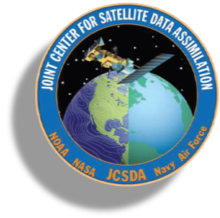Article by Katherine Shanahan, JCSDA Program Coordinator
Joint Effort for Data assimilation Integration (JEDI) is a unified and versatile data assimilation (DA) system for Earth system prediction spearheaded by the Joint Center for Satellite Data Assimilation (JCSDA). JEDI Academies are designed to be week-long training tutorials aimed at engaging members of affiliated partner institutions, scientific, academic, private sector, and public communities. Academies offer attendees both lecture sessions and practicums (hands-on practice exercises with JEDI) to familiarize participants with the JEDI infrastructure, discuss recent updates, and collaboratively work on improving the JEDI framework. The JEDI software package can be run on multiple platforms from laptops to supercomputers, for a variety of purposes, such as teaching and learning DA fundamentals and the development and validation of new DA algorithms and observational operators. The goal of the JCSDA JEDI project is to produce open-source code that can be utilized by a variety of audiences for a wide range of research projects and operations. In the wake of the first public release of JEDI-FV3, the JCSDA is ramping up training opportunities for the JEDI user community such as JEDI Academies, self-paced online tutorials, and short courses at conferences like the AMS 101st Annual Meeting in January 2021.
The 5th JEDI Academy was the first virtually hosted Academy by the JCSDA. It was conducted via Zoom the week of November 16 - 20, 2020. Spanning five days, the 5th JEDI Academy consisted of several sets of lectures and practical sessions each day. Attendees were encouraged to work through practical exercises together via small-group sessions in breakout rooms. Around 40 participants joined the Academy from several nationwide universities, UCAR, and federal agencies such as NOAA and NASA. Typically JEDI Academies are held in person, serving as outlets for networking and face-to-face collaboration across partnering institutions and communities. According to participants, the 5th Academy was an excellent learning and networking experience despite the virtual environment.
The lectures, presented by several members of the JEDI core team, covered topics such as building and running JEDI, data assimilation algorithms, Object Oriented Prediction System (OOPS) space, and more. Lectures were recorded live and posted to the JCSDA website for public viewing. Practical sessions had participants working on running JEDI in containers, adding observations and filter tests, and completing code reviews - providing a comprehensive overview of how to use and contribute to JEDI code.
The images above form a collection of stills from 5th JEDI Academy lecture presentations given by Dr. Benjamin Ménétrier, Dr. Yannick Trémolet, and Dr. Anna Shlyaeva and questions asked on Slido during Q/A (from left to right). Click on images to enlarge.
Right now, involvement in the JEDI Academy happens on an as-needed and requested basis, usually for individuals who already have a good idea of data assimilation science and practice. The JCSDA is working on expanding these opportunities to reach individuals with a wider range of skill sets and interests, from complete beginners to those who want to use JEDI for their own advanced research projects.
Next week, December 7 - 11, 2020, the JCSDA is hosting another virtual Academy for members of the UK Met Office and the US Air Force. Hosting Academies virtually allows for a broader participant base while pre-recorded lecture videos give way to schedule flexibility. We will have a blend of synchronous (practical sessions) and asynchronous (pre-recorded lectures) instruction so that the Academy can serve as an effective training session across time zones. Due to growing interest in virtual Academies after we emerge from the pandemic, the JCSDA hopes to offer a mix of in-person and virtual Academies in the future to better serve the needs of our partners and the interested public.




